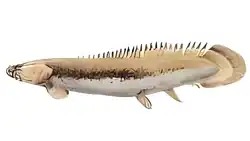Bawitius
Bawitius is an extinct genus of giant polypterid from the Upper Cretaceous (lower Cenomanian) Bahariya Formation of Egypt.[1] The type species is B. bartheli, named as a species of Polypterus in 1984,[2] and the genus etymology comes from Bawiti, the principal settlement of the Bahariya Oasis in Egypt.[1] It is known from the holotype TU-B SFB 69 Vb 003 (= Bah 5/12-016): left ectopterygoid scales and some sparse scales.[2][1]
| Bawitius Temporal range: Late Cretaceous, | |
|---|---|
 | |
| Restoration of Bawitius | |
| Scientific classification | |
| Domain: | Eukaryota |
| Kingdom: | Animalia |
| Phylum: | Chordata |
| Class: | Actinopterygii |
| Order: | Polypteriformes |
| Family: | Polypteridae |
| Genus: | †Bawitius Grandstaff et al. 2012[1] |
| Species: | †B. bartheli |
| Binomial name | |
| †Bawitius bartheli | |
| Synonyms | |
| |
Morphology
Compared to modern polypterids, Bawitius was enormous: the Bawitius holotype ectopterygoid is five times larger than the one of Polypterus and the scales are unusually large, too: these remains suggest the living animal may have been up to 300 centimeters (9.8 feet) in length.[1]
The morphology of Bawitius is different enough to justify its assignment to a new genus apart from Polypterus.[2] Unique features of the genus are, for example, an anterioposteriorly elongated contact between the lateral process and the maxilla, a high, narrow ectopterygoid and the presence of 14 teeth in the main tooth row.[1]
The scales are different, too, apart from size, from those of modern polypterids:[2] they feature a discontinuous ganoine layer, a rectilinear shape, and small articular processes.[1]
Ecological relevance
The existence of drastically different polypterids such as Bawitius and Serenoichthys corroborates the existence of a variety of polypterid fishes in the ecosystems of Late Cretaceous of North Africa and Brazil.[1]
References
- Grandstaff, B. S; Smith, J. B.; Lamanna, M. C.; Lacovara, K. J.; Abdel-Ghani, M. S. (2012). "Bawitius, gen. nov., a giant polypterid (Osteichthyes, Actinopterygii) from the Upper Cretaceous Bahariya Formation of Egypt". Journal of Vertebrate Paleontology. 32 (1): 17–26. doi:10.1080/02724634.2012.626823. S2CID 140547157.
- Schaal, S. (1984). Oberkretazische Osteichthyes (Knochenfische) aus dem Bereich von Bahariya und Kharge, Ägypten, und ihre Aussagen zur Palökologie und Stratigraphie. Berliner Geowissenschaftliche Abhandlungen Reihe A, 53: 1–76.